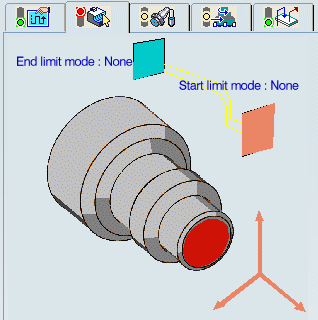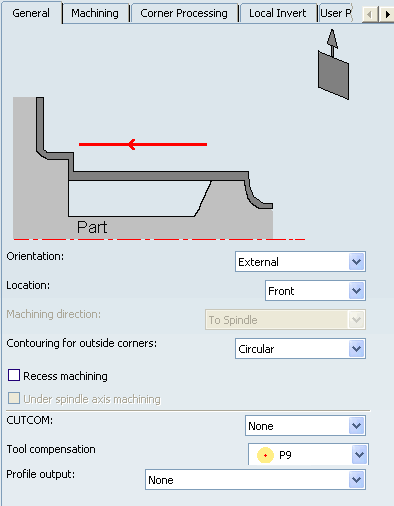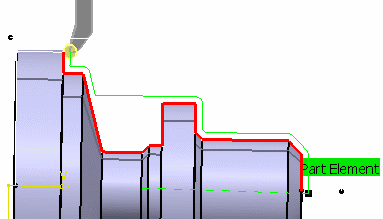Creating a Profile Finish Turning Operation | |||||
|
| ||||
Activate the Manufacturing Program and click Profile Finish Turning
 in the Lathe Machining Operations toolbar.
in the Lathe Machining Operations toolbar.A Profile Finish Turning entity is added to the Manufacturing Program. The Profile Finish Turning dialog box appears directly at the Geometry tab
 .
.Note: Geometry tab includes a sensitive area to help you identify the Geometry to be machined. This sensitive area is colored red indicating that thisGeometry is required for defining the Machining Operation.

Still in the Geometry tab.
- Click the red part area in the Geometry tab and then select the
desired part profile in the 3D window.
See Selecting Edges and Faces to Define Geometry
The part area changes color to green indicating that this Geometry is now defined.
-
Right-click the Geometry to be assigned the local value,
and select Add Local Information in the contextual menu.
In addition to the global offsets that you can assign to the selected profile, you can also add local values.
A dialog box appears allowing you to assign the desired local values. Other contextual commands are also available for analyzing and resetting local information. For more information, please refer to the Local Information.
- Click the red part area in the Geometry tab and then select the
desired part profile in the 3D window.
Select the Strategy tab
 .
.- Specify the machining strategy parameters.
- Orientation: External
- Location: Center
- Machining direction: Automatically set To spindle
- Set other optional parameters in the Machining,
Corner Processing,Local Invert, User Parameters tabs.
Note: You can locally invert machining directions using Local Information facilities. See Local Information.

- Specify the machining strategy parameters.
Go to the Tool tab
 to select a tool.
to select a tool.Select the Feeds and Speeds tab
 to specify the feedrates and spindle speeds for the
Machining Operation.
to specify the feedrates and spindle speeds for the
Machining Operation.
In addition to the global feedrates that you can assign for the Machining Operation, you can also add local feedrates to portions of the profile. Right-click the geometry to be assigned the local value, and select Add Local Information.
A dialog box appears allowing you to assign the desired local values. Other contextual commands are available for analyzing and resetting local information. See Local Information for more details.
Select the Macros tab
 to specify the Machining Operation transition paths.
to specify the Machining Operation transition paths. For more information, please refer to the Define Macros on a Lathe Operation.
Click Tool Path Replay
 to check the validity of the Machining Operation.
to check the validity of the Machining Operation.- The tool path is computed.
- A progress indicator is displayed.
- You can cancel the tool path computation at any moment before 100% completion.

Click OK to create the Machining Operation.